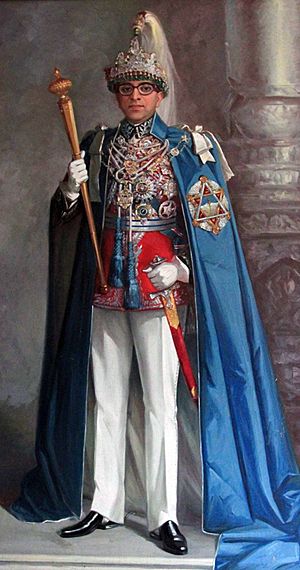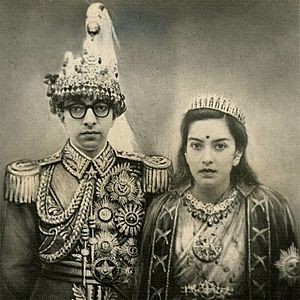Mahendra of Nepal facts for kids
Quick facts for kids Mahendra Bir Bikram Shah Dev |
|
|---|---|
 |
|
| King of Nepal | |
| Reign | 13 March 1955 – 31 January 1972 |
| Coronation | 2 May 1956 |
| Predecessor | Tribhuvan |
| Successor | Birendra |
| Born | 11 June 1920 Narayanhity Royal Palace Kathmandu, Kingdom of Nepal |
| Died | 31 January 1972 (aged 51) Diyalo Bangala, Bharatpur, Kingdom of Nepal |
| Spouse | Crown Princess Indra Rajya Lakshmi Devi (m. 1940–1950, her death) Queen Ratna Rajya Lakshmi Devi (m. 1952–1972, his death) |
| Issue | Princess Shanti Princess Sharada King Birendra King Gyanendra Princess Shobha Prince Dhirendra |
| Dynasty | Shah dynasty |
| Father | Tribhuvan of Nepal |
| Mother | Kanti Rajya Lakshmi Devi |
| Religion | Hindu |
Mahendra Bir Bikram Shah Dev (Nepali: महेन्द्र वीर विक्रम शाह) was the King of Nepal from 1955 to 1972. He was born on June 11, 1920. His father was King Tribhuvan of Nepal.
Even though his father was king, Mahendra spent his early life mostly confined to the Narayanhity Royal Palace. In 1940, he married Indra Rajya Lakshmi Devi. They had three sons: Birendra, Gyanendra, and Dhirendra. They also had three daughters: Shanti, Sharada, and Shobha. Crown Princess Indra passed away in 1950. In 1952, Mahendra married Indra's younger sister, Ratna Rajya Lakshmi Devi. They did not have any children together.
Contents
King Mahendra's Rule
Mahendra became King of Nepal after his father, Tribhuvan. He was officially crowned on May 2, 1956.
Changes in Government (1960)
On December 15, 1960, King Mahendra made big changes to the government. He stopped the country's constitution and closed the elected parliament. He also removed the government leaders, including the Prime Minister, B. P. Koirala, and put them in prison.
King Mahendra then started a new system called the Panchayat system. This system had councils at the village, district, and national levels. It was a type of "guided democracy," meaning the king kept most of the power. He also made sure Nepal stayed neutral between its powerful neighbors, China and India.
The Panchayat System (1960–1972)
In 1960, King Mahendra took full control of the country. He said the previous government had problems like corruption and not keeping law and order. He banned all political parties and put many political leaders in jail. He also limited people's freedoms and controlled the press.
In December 1962, King Mahendra introduced a new constitution. This constitution created the party-less Panchayat system. In this system, people could elect their representatives, but the king still held the real power. Anyone who disagreed with the system was called "anti-national."
The Panchayat System was created after King Mahendra removed the first democratically elected government. In 1961, he set up a committee to suggest changes to the constitution. These changes would get rid of political parties and create a "National Guidance" system led by the king.
Major Achievements
King Mahendra introduced a land reform program. This program gave land to many people who did not own any. The Mahendra Highway, also known as the East-West Highway, was built during his time. This important road runs across the southern part of Nepal.
He also started the Back to the Village National Campaign in 1967. This was a large effort to help develop rural areas. King Mahendra also played a key role in Nepal becoming a member of the United Nations in 1955.
Special Recognition
In 1962, King Mahendra was given the special title of British Field Marshal. This is a very high military rank.
Royal Visit to the USA (1967)
In 1967, King Mahendra and Queen Ratna visited the United States of America. They were welcomed by the US President, Lyndon B. Johnson, and Mrs. Johnson in Washington D.C. They received a special "guard of honor" during their visit.
Hobbies and Interests
King Mahendra enjoyed many activities, just like other noblemen of his time. He was also a talented writer. He wrote many songs and poems. Some people even call him the first lyricist of Nepal. Famous singers like Gulam Ali and Lata Mangeshkar later sang his songs.
Death and Successor
King Mahendra suffered a serious heart attack during a hunting trip in Chitwan. He passed away at Diyalo Bangala, a royal palace in Bharatpur, on January 31, 1972. His body was then flown to Kathmandu for a state funeral.
His son, Birendra, became the new king on February 24, 1975.
Honors and Awards
King Mahendra received many honors from Nepal and other countries:
- Sovereign of the Order of Nepal Pratap Bhaskara
- Sovereign of the Order of Ojaswi Rajanya
- Sovereign of the Order of Nepal Taradisha
- Sovereign of the Order of Tri Shakti Patta
- Sovereign of the Order of Gorkha Dakshina Bahu
- Most Glorious Mahendra Chain (1961)
- Commemorative Silver Jubilee Medal of King Tribhuvan (1936)
He also received honors from other nations:
 Iran: Grand Collar of the Order of Pahlavi, 1960
Iran: Grand Collar of the Order of Pahlavi, 1960 Iran: Commemorative Medal of the 2500th Anniversary of the founding of the Persian Empire, 1971
Iran: Commemorative Medal of the 2500th Anniversary of the founding of the Persian Empire, 1971 Japan: Collar of the Order of the Chrysanthemum, 1960
Japan: Collar of the Order of the Chrysanthemum, 1960 Portugal: Grand Cross of the Order of Saint James of the Sword, 1960
Portugal: Grand Cross of the Order of Saint James of the Sword, 1960 France: Grand Cross of the Order of Legion of Honour, 1956
France: Grand Cross of the Order of Legion of Honour, 1956 Finland: Grand Cross with Collar of the Order of the White Rose, 1958
Finland: Grand Cross with Collar of the Order of the White Rose, 1958 Belgium: Grand Cross of the Order of Leopold II, 1964
Belgium: Grand Cross of the Order of Leopold II, 1964 Germany: Grand Cross Special Class of the Order of Merit of the Federal Republic of Germany, 1964
Germany: Grand Cross Special Class of the Order of Merit of the Federal Republic of Germany, 1964 Kingdom of Laos: Collar of the Order of the Million Elephants and the White Parasol, 1970
Kingdom of Laos: Collar of the Order of the Million Elephants and the White Parasol, 1970 Pakistan: Nishan-e-Pakistan, 1970
Pakistan: Nishan-e-Pakistan, 1970 Netherlands Grand Cross of the Order of the Netherlands Lion, 1967
Netherlands Grand Cross of the Order of the Netherlands Lion, 1967 United Kingdom: Royal Victorian Chain, 1961
United Kingdom: Royal Victorian Chain, 1961 Philippines: Collar of the Order of Sikatuna, Rank of Raja, 1971
Philippines: Collar of the Order of Sikatuna, Rank of Raja, 1971
Images for kids
See also
 In Spanish: Mahendra de Nepal para niños
In Spanish: Mahendra de Nepal para niños
 | Laphonza Butler |
 | Daisy Bates |
 | Elizabeth Piper Ensley |
















